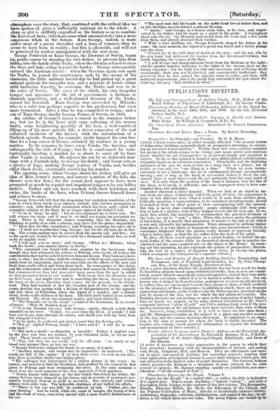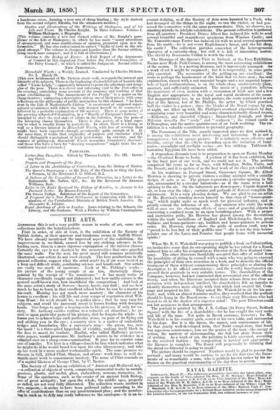PUBLICATIONS RECEIVED.
Bowls.
The Life and Correspondence of Andrew Combe, Fellow of the Royal College of Physicians of Edinburgh, &c. By George Combe. Elementary Sketches of Moral Philosophy, delivered at the Royal In- stitution, in the-years 1804, 1805, and 1806. By the late Reverend Sydney Smith, M.A.
The Use and Abuse of Alcoholic Liquors, in Health and Disease. Prize Essay. By William B. Carpenter,. M.D., &c.
The Comedy of Dante Alight-eel. Translated by Patrick Bannerman, sq.
Christmas Eve and Easter Day; a Poem. By Robert Browning.
Perspective; its Principles and Practice. By G. B. Moore. [About a dozen years since, an artist strongly attacked "the present system of delineating buildings perpendicularly in perspective drawings, as convey- - ing an incorrect representation." Within these few years another assailant has declared the whale science to be wrong; and many artists and amateurs doubt whether the art of perspective as at present taught and practised is correct. So far as this opinion is founded upon philosophical considerations, itis partly based on an erroneous conclusion. From habit, and the lightning quickness of the eye, we seem to take in a largo view at a glance; but D2 reality we can only see "one thing, at a. time." When we seem instan- taneously to see a landscape, the eye is continuously though unconsciously moving ; and as long as the head, or eye-socket rather, is fixed, the (as- sumed) lines of each object reach the eye uniformly from the same point of view. It is only when the position of the head is changed, that the line of the lines, so to speak, is different ; and some impugners seem to have ccase founded these two principles. Another objection is better founded. When we look at an object in na- ture from one place, technically called the point of view the sippearanee is more or less different from what it would be if seen from another place. Critically speaking, a representation, to be examined advantageously, should be looked at from an ideal point of view corresponding with the natural. But this is never done continuously : people continually shift their posi- tion to look at a picture, even if they happenever to hit the true one. To re- medy this, artists, like musicians to accommodate the practical diviaions of the scale, are apt to " cook " a little- When this is done under the. guidance • of knowfedge, it is merely that adaptation of nature to the end of art which is not only- allowable but indispensable. When attempted by nothing higher than knack, it is very likely to degenerate into gross meorreetneas--whieh is sometimes displayed when the painter really intends to represent literally what is before him ; so that the art suffers from the fault of the artist. To place all these vexed questions on a sound footing—to defend the ge- neral truths of the science while its theoretical shorteotaings in practice are admitted and the causes pointed out—is the abject of Mr. Moore. In carry- ing out this intention, he also expounds the system of perspective; illustra- nig his text by a variety of diagrams and views, m twenty-one plates, which accompany the letterpress in a separate volume.] The Law and Practice of Benefit Building Societies, Terminating and Permanent, and of Freehold Land Societies, &c. By John Thomp- son, Esq., of the Inner Temple, Barrister-at-law. lit is a grave question whether the Legislature has not been much too hasty legalizing projects based upon arithmetical truths, that, as men are consti- tuted, cannot often be successfully reduced topractiee, even if they were fairly carried into execution—which it is to be feared is Beldam the case. For one person who is helped by Loan Societies, perhaps ten are more deeply involved, or rather, they are encouraged to waste their means or those of their creditors on the managers of these companies; in addition to which, there are frequent oppressions and frauds, as the world sees by the Police reports, practised on the poor by means of the law-, but for which the law affords no remedy. The Building Societies are not perhaps so open to the imputation of paltry frauds; they are based, we suspect, on the same abstract calculations as Dr. Price's compound interest "globe of gold" and Pitt's sinking-fund, even if the pro- spectus-statements of the advantages were more accurate than some of them are. However, being established, it is well to know the law upon them; and Mr. Thompson's treatise on'the subject is a plain and etiecinet account of the Aet, and the various decisions thereupon. Its amplitude is no objec- tion to the class of persons for whom the book is chiefly intended. The treatise also contains much practical information as regards the formation and management of these societies.] Twelve Advent Sermons and a Pastor's Address on the Twentieth An- niversary of his Incumbency. By Edward B. Ramsay, M,A., F.R.S.R., Incumbent of St. John's Episcopal Chapel, Edinburgh, and Dean of the Diocese.
[A series of discourses on topics appropriate to the season in which they were preached ; beginning with the Responsibilities of Advent, and ending with Death, Judgment, Hell, and Heaven. They are affectionate and earn- est in spirit, and sound in doctrine, but somewhat general ; wanting that close application of Scriptural lessons to man's daily business which give life and attraction to the highest order of pulpit discourses. The Pastoral Address which precedes the Sermons is a document of sense interest, for its calm avowal of opinion ; Mr. Ramsay standing equally on justification and sane- tification-4‘all the counsel of God."] Chambers's Papers for the People. 'Volume I. [" Papers for the People " is a capital title ; or rather, the title is indicative of a capital plan. Papers mean anything—"infinite variety. " • and such a description fairly belongs to the contents of the first volume. The Bona Etruna, Ebenezer Elliott, the Myth, the Education of the atizen an the Popular Cultivation of Music, directly or incidentally embrace history, areology, biography, criticism, utilitarianism, and topics of the day ; in ad- dition to all which there are two tales, The seven Papers are bound up in • a handsome cover, forming a new mra of cheap binding ; the style derived from the second subject, Etruria, but the ornaments modern.]
Studies and Illustrations of the Writings of Shakspere, and of his Life and Times. By Chaiies Knight. In three volumes. Volume I. William Shakspere, a Biography.
[This volume contains a new and revised edition of Mr. Knight's pares plume of the Life of Shakspere ; in which he has made " many alterations of arrangement, and some modifications of opinion, grounded upon new in- formation." He has also endeavoured to correct "faults of taste in the ori- ginal attempt." The volume is cheaper and handier than the former edition, being much mere compact ; and it is full of illustrations.]
Gorham n, the Bishop of Exeter. A Full Report of the Arguments of Counsel in this important Case before the Judicial Committee of the Privy Council ; to which is added the Judgment. Second edition.
Ntree Pm/1°7)10AL.
Household frora's ; a Weekly Journal. Conducted by Charles Dickens. No. L March 30.
[This new hebdomadal of Mr. Dickens starts well, as regards the interest and diversity of its subjects. There is the beginning of a truthful tale of humble life, caned " Lizzie Leigh,"—apparently intended to paint the affections and strug- gles of the poor. There is a clever and informing visit to the Post-office in the evening; containing some account of the economy and working of that great establishment "The Amusements of the People" is a paper on the cheap theatres ; embracing a descriptive skit oe one of their pieces, with some reflections on the philosophy of public instruction by this channel. "An Inci- dent in the Life of Mademoiselle Clair= " is an account of supposed super- natural occurrences with which the lady deemed herself to be connected ; followed by, a probable explanation of the mystery. There is some notice of the growing subject of Colonization, in a " Bundle of Emigrant's Letters,"— intended'to show the real state of affairs in the Colonies, from, the pens of the labouring classes themselves. There is also poetry, of a kind supe- rior to what is usually found in periodicals. In short, there is a living as well as a literary interest in Household Words, with less of writing than might have been expected—though occasionally quite enough of it. At the same time it wants that originality of purpose and character which
i
should distinguish a periodical of high pretensions. In exterior, and the manner of getting-up, Household. Words resembles Chambers's Journal; and those who lave a turn for "drawing comparisons " might trace the re- semblance beyond externals.]
RusriatTs.
_Lattim-Dag Pamphlets. Edited by Thomas Carlyle. No. III. Down- ing Street.
Projects and Prospects of the Day.
A. Letter to the Archbishop of Canterbury, from the Bishop of Exeter. The Qll Me 8 Supremacy ; or the Duty of the Church to Obey the Law. A Sermon, by the. Reverend J. G. Gifford, B.A.
A Defence of the Committee of Council on Education, in a Letter to the . Honourable Mr. Talbot, Q.C., &c. By the Reverend Sir Erasmus Williams, Bart. letter to the Bight Reverend the Bishop of Brechin„ in Answer to his _Pastoral Letter. By Horace Fenuie.k. 77m Owens College. Substance of the Report of the Committee. A Proposal for a New Penal Settlement, in Connexion with the Colo- nisation of the Uninhabited Districts of British North America. By Alexander K. Isbister.
Royal Academy of Arts in London. Laws relating to the Schools, the . • Library, and the Students. With a Preface by William Cunningham.



























 Previous page
Previous page